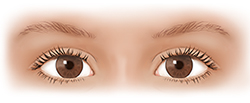A
B
C
D
E
F
G
H
I
J
K
L
M
N
O
P
Q
R
S
T
U
V
W
X
Y
Z
Topic IndexLibrary Index
Click a letter to see a list of conditions beginning with that letter.
Click 'Topic Index' to return to the index for the current topic.
Click 'Library Index' to return to the listing of all topics.
Common Eye Problems in Children
|
 |
| Normal eye |
|
 |
| Wandering eye |
|
Wandering eye
Sometimes a child’s eyes don’t work together as they should. One eye may move separately from the other ( strabismus). This is sometimes called crossed eyes. Then the brain receives a different image from each eye. The brain may switch between the two images or just turn off one image. When this happens, the child stops using that eye ( amblyopia). This is called lazy eye. The eye may move or wander all the time. Or it may wander only when your child is tired, ill, or looking at nearby objects. It's normal for babies’ eyes to appear misaligned or wandering up to 4 months old. If this continues after age 4 months, let your child's healthcare provider know. Treatment may include an eye patch, eye drops, glasses, or surgery. According to the National Eye Institute, all children should have an eye exam at least once between ages 3 and 5.
Vision problems
Your child is nearsighted if objects that are far away look blurry. Your child is farsighted if close-up objects look blurry. Extreme farsightedness means that both near and far objects are fuzzy. If the front of your child’s eye has an abnormal curve ( astigmatism), objects look blurry at all distances. These common childhood vision problems can often be corrected with glasses or contact lenses. Vision problems can sometimes lead to amblyopia if they're not corrected.
Infections and injuries
Eye infections and injuries are common in children. Viral and bacterial infections spread quickly through classrooms and daycares. Children can also be hit in the eye. Or they can get dirt and other objects in their eyes. Eye infections and injuries need to be treated right away. Some can cause lasting damage to the eye.
Online Medical Reviewer:
Amy Finke RN BSN
Online Medical Reviewer:
Dan Brennan MD
Online Medical Reviewer:
Rita Sather RN
Date Last Reviewed:
9/1/2024
© 2000-2025 The StayWell Company, LLC. All rights reserved. This information is not intended as a substitute for professional medical care. Always follow your healthcare professional's instructions.